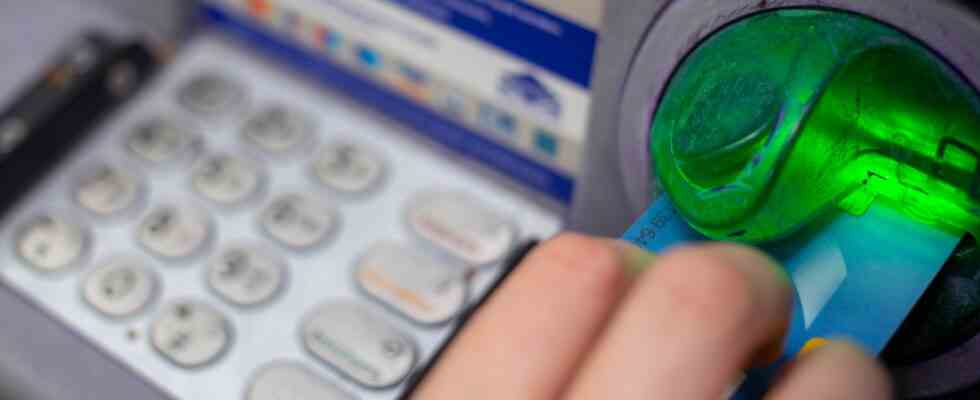Status: 10/24/2022 5:06 p.m
If you overdraw your account, you have to pay interest – some banks charge up to 14 percent, a survey has shown. Small, rural institutes in particular benefit disproportionately.
If you overdraw your account at VR-Bank Landsberg-Ammersee, you have to pay comparatively high overdraft interest. The Bavarian cooperative bank charges around 14.30 percent per year. This makes the bank the most expensive in a nationwide comparison in terms of overdraft interest.
This is the result of a survey conducted by the online consumer portal Biallo among almost 1,200 banks and savings banks. So far, the bank has not commented on why the VR-Bank Landsberg-Ammersee has such high overdraft interest and how many customers currently have to pay it.
Many smaller institutes “reach a decent amount”
The Volksbank Heimbach, at 14.10 percent, and the Raiffeisenbank Plankstetten, at 13.75 percent, charge similarly high interest rates. “It’s noticeable that smaller, regional cooperative banks and savings banks in particular are often quite good at overdraft interest,” says Kevin Schwarzinger, editor at Biallo. It is often the same institutes that are among the more expensive financial institutions for other items, such as account fees.
On average, according to the study, financial institutions nationwide have an overdraft interest rate of 10.07 percent. So it’s basically a lucrative business for them if their customers have to overdraw their accounts as a result of high inflation and skyrocketing energy prices, says Biallo editor Schwarzinger: “But that aggravates the financial situation of the consumers affected.”
Some banks charge significantly less
However, some banks are also more cautious. For example, the Savings and Credit Bank of Evangelical Free Church Congregations only pays 3.10 percent interest per year. However, the cooperative bank based in Bad Homburg in Hesse emphasizes that only a really small group of church employees benefit from this moderate overdraft interest rate.
The national Hypovereinsbank offers similarly favorable conditions for some account models, namely an overdraft interest rate of 2.75 percent annually. If you overdraw your account at the sustainable GLS Bank, it can even be free of charge for a sum of up to 10,000 euros. For Biallo editor Schwarzinger, this is a special case: “Because the ecological cooperative bank takes membership fees of 60 euros per year from its customers, so they can afford to be generous with the overdraft facility.”
Framework credit possible alternative
Joachim Wuermeling also notes that there are huge differences in the banking industry when it comes to overdraft interest. He is responsible for banking supervision on the Executive Board of the Bundesbank. Ultimately, however, each financial institution sets this interest rate independently, says Wuermeling. “We are currently in a period of upheaval because of the turnaround in interest rates and the banks are reacting to this in very different ways,” says the bank supervisor. Ultimately, competition will decide which interest rate will ultimately dominate. So if the overdraft interest at his house bank is too high, Wuermeling recommends switching to another bank.
Another, often cheaper alternative for many consumers can be a credit line, advises Josefine Lietzau, an expert on banking products at the Finanztip internet portal. “Customers can use this financial cushion quite flexibly,” explains Lietzau: “But they should really pay back the money regularly so that they don’t get into a debt trap with this loan.”
Financial turnaround sees banks as having an obligation
In the face of more and more new crises, calls are being made in politics to cap interest rates on overdraft facilities. The German banking industry, as the leading industry association, rejects such interventions. “Because that would probably mean that this cap would probably be the rate that would then apply,” says a statement. This would limit competition, but it is precisely this competition that would benefit consumers. At the moment, thanks to a large offer, they would still have it in their own hands without a cover, where and on what terms they wanted to use an overdraft facility, according to the German banking industry.
And by the time politicians have launched such a dispo cover, it would probably be too late, according to the Finanzwende citizens’ movement. In the energy crisis, the situation is now coming to a head for many. Therefore, Finanzwende spokesman Julian Merzbacher sees the responsibility of the banks and savings banks and calls on them to moderate. “Because many people are currently getting into financial problems through no fault of their own, and the banking industry should position itself in such a way that it is really a partner in the crisis and does not make excessive profits from it,” says Merzbacher.

